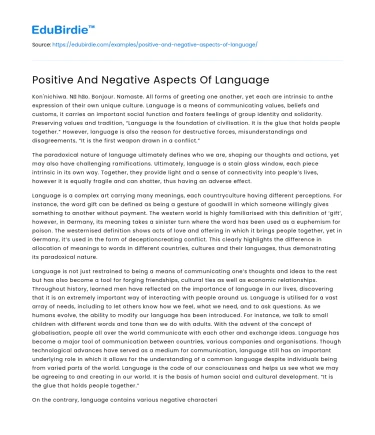Kon'nichiwa. Nǐ hǎo. Bonjour. Namaste. All forms of greeting one another, yet each are intrinsic to anthe expression of their own unique culture. Language is a means of communicating values, beliefs and customs, it carries an important social function and fosters feelings of group identity and solidarity. Preserving values and tradition, “Language is the foundation of civilisation. It is the glue that holds people together.” However, language is also the reason for destructive forces, misunderstandings and disagreements, “It is the first weapon drawn in a conflict.”
The paradoxical nature of language ultimately defines who we are, shaping our thoughts and actions, yet may also have challenging ramifications. Ultimately, language is a stain glass window, each piece intrinsic in its own way. Together, they provide light and a sense of connectivity into people’s lives, however it is equally fragile and can shatter, thus having an adverse effect.
Save your time!
We can take care of your essay
- Proper editing and formatting
- Free revision, title page, and bibliography
- Flexible prices and money-back guarantee
Language is a complex art carrying many meanings, each countryculture having different perceptions. For instance, the word gift can be defined as being a gesture of goodwill in which someone willingly gives something to another without payment. The western world is highly familiarised with this definition of ‘gift’, however, in Germany, its meaning takes a sinister turn where the word has been used as a euphemism for poison. The westernised definition shows acts of love and offering in which it brings people together, yet in Germany, it’s used in the form of deceptioncreating conflict. This clearly highlights the difference in allocation of meanings to words in different countries, cultures and their languages, thus demonstrating its paradoxical nature.
Language is not just restrained to being a means of communicating one’s thoughts and ideas to the rest but has also become a tool for forging friendships, cultural ties as well as economic relationships. Throughout history, learned men have reflected on the importance of language in our lives, discovering that it is an extremely important way of interacting with people around us. Language is utilised for a vast array of needs, including to let others know how we feel, what we need, and to ask questions. As we humans evolve, the ability to modify our language has been introduced. For instance, we talk to small children with different words and tone than we do with adults. With the advent of the concept of globalisation, people all over the world communicate with each other and exchange ideas. Language has become a major tool of communication between countries, various companies and organisations. Though technological advances have served as a medium for communication, language still has an important underlying role in which it allows for the understanding of a common language despite individuals being from varied parts of the world. Language is the code of our consciousness and helps us see what we may be agreeing to and creating in our world. It is the basis of human social and cultural development. “It is the glue that holds people together.”
On the contrary, language contains various negative characteristics which can be utilised as being the first tool in triggering conflict. While many countries share common understandings of words, disconnection in linguistic communication is still widely prevalent today, where both the speaker and the hearer don’t share a common understanding. Standardisation has not been introduced in many languages where each culture strives to be the leading power, creating utmost importance towards their own language. Language is more tangible than race or religion, hence is one of the leading causes in rising tension in many cultural groups. Misunderstandings between high-context and low-context communication is a major factor in creating conflict. Many western cultures utilise low-context communication, where the language doesn’t require context or interpretation to give it meaning. However, Eastern, Latin American and African cultures tend to use high-context communication, in which background knowledge and understanding is required. If such differences are not understood and adjusted for, confusion is almost inevitable. Each culture has its own traditional language in which it influences its recipients’ assumptions each in a different way, thus representing language as a form of misdirection. Different cultures have very different worldviews, cross-cultural communication is especially likely to change meaning as the sender may have a different worldview from the receiver. As language is the first tool utilised in any interaction and discussion, its different views and understanding can ultimately we regarded as a weapon. “It is the first weapon drawn in a conflict.”
In essence, language has provided humans with the basis of civilisation, allowing us to communicate with one another. While language does contain various benefits in its ability to transfer human thoughts, it does lack several qualities that if misunderstood, conflict could arise. It provides a way for people to evolve, as well as is the first factor in creating arguments. “Language is the foundation of civilisation. It is the glue that holds people together. It is the first weapon drawn in a conflict.”






 Stuck on your essay?
Stuck on your essay?

